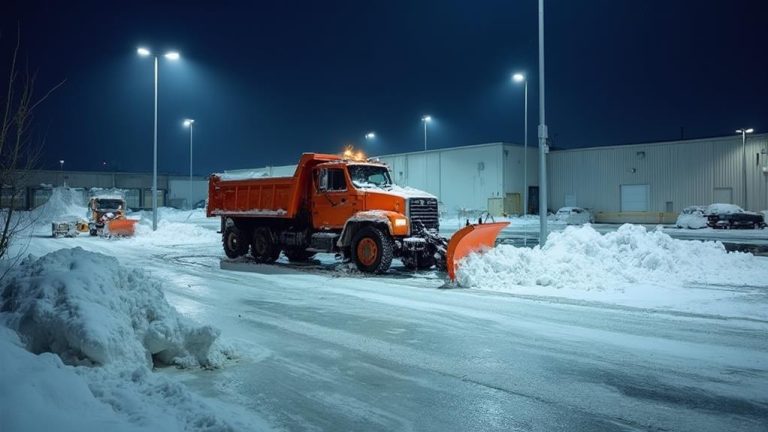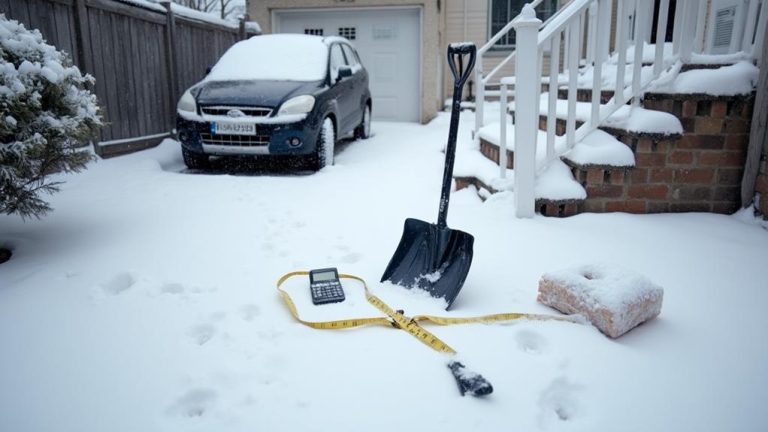Seasonal maintenance of your snow removal equipment is essential for supreme performance and longevity. You'll need to establish a regular inspection schedule, covering critical components like engines, hydraulics, and electrical systems. Proper storage techniques, including thorough cleaning, lubrication, and protection from environmental factors, are indispensable during off-seasons. Implementing off-season care protocols, such as fluid checks and battery maintenance, guarantees your machinery is ready when winter arrives. By adhering to these practices, you'll benefit from improved equipment lifespan, heightened performance, cost savings, increased safety, and better resale value. Understanding the intricacies of seasonal maintenance can drastically impact your snow removal operations' efficiency and effectiveness.
Snow Plowing Highlights
- Establish a regular inspection schedule to identify wear, damage, and necessary repairs.
- Clean equipment thoroughly before storage, removing dirt, debris, and residual materials.
- Apply lubricants and protective coatings to prevent corrosion and protect moving parts.
- Store equipment in a dry, climate-controlled environment or use weatherproof covers for outdoor storage.
- Perform off-season maintenance, including fluid checks, battery care, and noting required repairs or replacements.
Definition of Seasonal Equipment Care
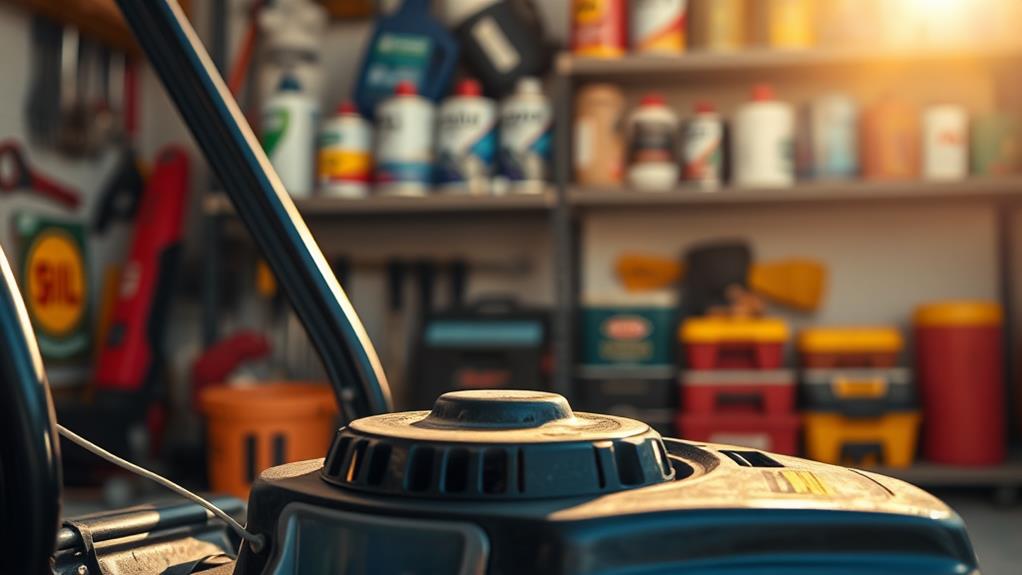
Snow Plow Solutions offers vital seasonal equipment care services to help customers maintain their snow removal equipment in top condition. Our expert technicians specialize in servicing snowplows, salt spreaders, and other winter maintenance machinery, guaranteeing they're ready for action when the cold weather hits.
We provide thorough inspections, parts replacement, lubrication, and performance tuning to extend the lifespan of equipment and minimize unexpected breakdowns during pivotal snow removal operations. By entrusting their seasonal equipment care to Snow Plowing and Removal Services, customers can rely on efficient, reliable performance throughout the winter season, ultimately saving time and money while maintaining safe, clear roads and properties.
Additionally, we comply with local safety regulations to ensure all equipment is operated safely and effectively.
Regular Inspection Schedule
To guarantee your equipment remains in top condition throughout the year, a regular inspection schedule is essential. By implementing a systematic approach to equipment checks, you'll ascertain that your machinery operates efficiently and safely, regardless of the season. Start by creating an all-encompassing checklist that covers all critical components of your equipment, including engines, hydraulic systems, electrical connections, and wear parts.
Establish a routine that aligns with your operational needs, scheduling inspections at intervals that balance thoroughness with practicality. For heavy-use equipment, you may need to conduct weekly or bi-weekly checks, while less frequently used machinery might require monthly inspections. During these evaluations, pay close attention to signs of wear, corrosion, or damage that could lead to breakdowns if left unaddressed.
Document your findings meticulously, noting any repairs or replacements that are needed, and prioritize maintenance tasks accordingly. By adhering to a regular inspection schedule, you'll not only extend the lifespan of your equipment but also minimize unexpected downtime and costly repairs, ensuring that your operations run smoothly throughout the year.
Proper Storage Techniques
While regular inspections keep your equipment in check during active use, proper storage techniques are equally important for maintaining machinery during off-seasons. To guarantee your equipment remains in ideal condition, you'll need to implement a comprehensive storage strategy that addresses various factors, including environmental protection, moisture control, and preventive maintenance.
Start by thoroughly cleaning your equipment, removing any dirt, debris, or residual materials that could cause corrosion or damage during storage. Next, apply appropriate lubricants to moving parts and protective coatings to exposed metal surfaces to prevent rust and oxidation.
You'll want to store your equipment in a dry, climate-controlled environment whenever possible, using dehumidifiers or moisture-absorbing products to minimize humidity-related issues. For outdoor storage, invest in high-quality, weatherproof covers that fit your equipment properly. It's essential to disconnect batteries, drain fluids, and seal openings to prevent contamination or pest intrusion. Additionally, consider elevating equipment off the ground using blocks or pallets to avoid moisture accumulation and potential damage.
Off-Season Care Protocols
During the off-season, equipment care takes on a new dimension. As a responsible equipment owner, you'll need to implement a thorough off-season care protocol to guarantee your machinery remains in top condition. This process involves several key steps that, when followed diligently, will protect your investment and prepare it for the next active season.
Begin by thoroughly cleaning all equipment, removing any debris, salt, or residual chemicals that may have accumulated during use. Next, inspect each piece for signs of wear or damage, making note of any repairs or replacements needed. Apply lubricant to moving parts and protect metal surfaces with a light coat of oil to prevent rust.
For hydraulic systems, check fluid levels and replace if necessary. Store batteries in a cool, dry place and use a trickle charger to maintain their charge. Cover equipment with breathable, weather-resistant tarps to shield it from dust and moisture.
Benefits
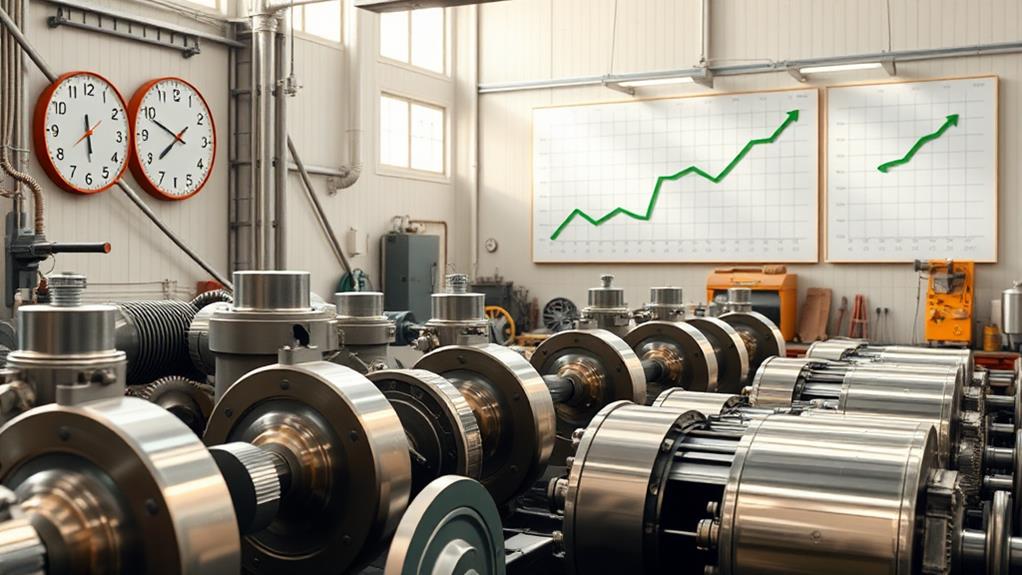
When you invest time and effort in seasonal equipment maintenance, you'll reap numerous benefits that extend far beyond the current season. By regularly servicing your equipment, you'll markedly improve its longevity, guarantee enhanced performance year-round, and ultimately save money through reduced repair costs and increased efficiency.
Additionally, keeping up with maintenance can help avoid disruptions similar to those prevented by commercial snow plowing. Furthermore, properly maintained equipment offers increased safety and reliability, allowing you to tackle tasks with confidence and minimize the risk of accidents or breakdowns during critical operations.
Improved Equipment Longevity
Longevity is the ultimate goal of seasonal equipment maintenance. By consistently caring for your machinery, you're not only ensuring its ideal performance but also considerably extending its lifespan. Regular upkeep prevents wear and tear from escalating into major issues, saving you time and money in the long run.
When you prioritize seasonal maintenance, you're investing in the future of your equipment and, by extension, your operations.
To maximize the longevity of your equipment, consider these key benefits:
- Reduced frequency of replacements
- Lower overall maintenance costs
- Improved resale value
- Enhanced reliability during peak seasons
- Decreased risk of unexpected breakdowns
Enhanced Performance Year-Round
Seasonal maintenance doesn't just extend your equipment's life; it also guarantees peak performance throughout the year. By adhering to a regular maintenance schedule, you'll make certain that your machinery operates at peak efficiency, regardless of the season. This consistent upkeep allows you to tackle any job with confidence, knowing that your equipment is always ready for action.
During routine maintenance, you'll have the opportunity to fine-tune your equipment's settings, calibrate sensors, and replace worn parts before they cause significant issues. This proactive approach means you'll experience fewer unexpected breakdowns and reduced downtime, allowing you to maximize productivity across all seasons. Additionally, well-maintained equipment consumes less fuel and energy, leading to cost savings and improved environmental performance.
Regular maintenance also allows you to familiarize yourself with your equipment's intricacies, enabling you to identify potential problems early on. This knowledge empowers you to make informed decisions about repairs, upgrades, or replacements, ensuring that your fleet remains cutting-edge and competitive. By investing in year-round maintenance, you're not only protecting your assets but also positioning your business for success in every season.
Cost Savings Over Time
Through consistent seasonal maintenance, you'll reap significant cost savings over time. By investing in regular upkeep of your equipment, you're not only prolonging its lifespan but also minimizing the risk of costly breakdowns and emergency repairs. Proper maintenance guarantees that your machinery operates at peak efficiency, reducing fuel consumption and lowering operational expenses. Additionally, well-maintained equipment retains its value better, potentially resulting in higher resale prices when it's time to upgrade.
Consider these cost-saving benefits of seasonal maintenance:
- Reduced frequency of major repairs
- Improved fuel efficiency and lower energy costs
- Extended equipment lifespan
- Higher resale value
- Decreased downtime and increased productivity
Increased Safety and Reliability
One of the most crucial benefits of seasonal maintenance is the dramatic increase in safety and reliability of your equipment. By adhering to a consistent maintenance schedule, you'll significantly reduce the risk of unexpected breakdowns and malfunctions that could compromise your operations and, more importantly, the safety of your team. Regular inspections, tune-ups, and repairs ensure that all components are functioning at their best, minimizing the potential for accidents or injuries caused by faulty machinery.
Moreover, well-maintained equipment performs more reliably, allowing you to meet deadlines and fulfill commitments without interruption. This enhanced reliability translates to improved productivity and customer satisfaction, as you'll be able to consistently deliver high-quality results. By addressing potential issues proactively, you'll also extend the lifespan of your equipment, reducing the need for premature replacements and minimizing downtime.
Additionally, properly maintained equipment operates more efficiently, consuming less fuel and reducing wear and tear on critical components. This efficiency not only contributes to cost savings but also ensures that your equipment performs at its peak when you need it most, especially during high-demand seasons or challenging weather conditions.
Snow Plowing Company Near you

Snow Plow Solutions offers thorough commercial snow plowing and removal services to keep your business operational during winter weather events. Our experienced team, composed of passionate snow removal experts, uses state-of-the-art equipment to efficiently clear parking lots, walkways, and entrances, ensuring safe access for employees and customers.
We provide customized snow management plans tailored to your specific property needs, including pre-treatment options, timely plowing, and snow hauling services. By partnering with Snow Plow Solutions, you can minimize liability risks, maintain business continuity, and focus on your core operations while we handle the challenges of winter weather.
Connect With A Team Member Today!
Don't let equipment issues slow you down this season! By taking proactive steps with your equipment maintenance, you can guarantee a smooth and efficient operation throughout the challenging winter months.
Our expert team is ready to help with all your maintenance needs. Call 555-123-4567 now to schedule your service appointment and keep your equipment running smoothly year-round. Act fast – our schedule fills up quickly!
Equipment Storage Best Practices
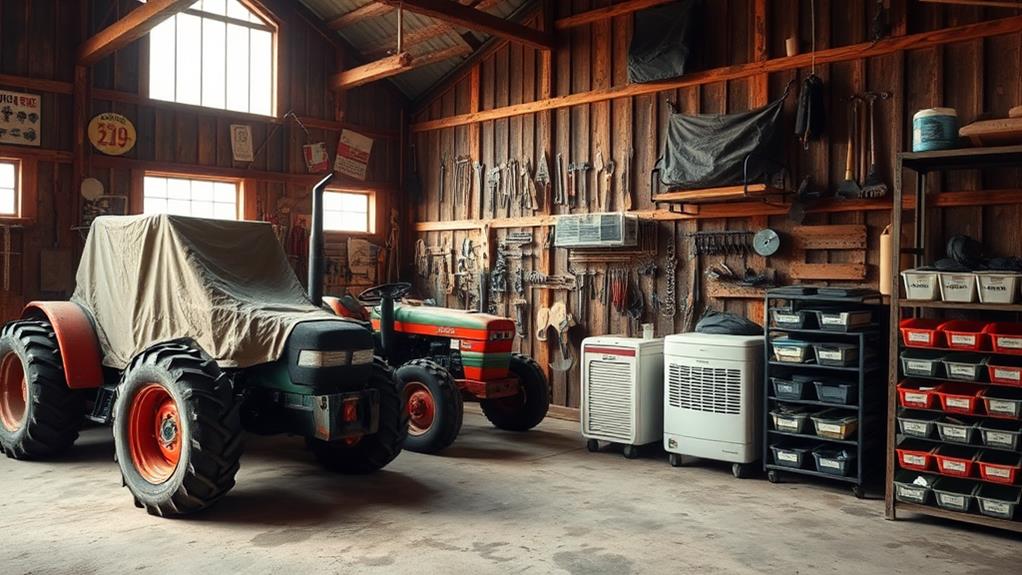
When it comes to storing your equipment during off-seasons, you'll need to follow some essential best practices to guarantee its longevity and performance. Before placing any machinery in storage, you should thoroughly clean and inspect it, removing debris and addressing any maintenance issues to prevent deterioration. To protect your investment, consider climate-controlled storage solutions that shield equipment from temperature fluctuations, humidity, and pests, while also implementing a regular inspection schedule to catch and address any emerging issues promptly.
| Storage Aspect | Best Practice | Benefit |
|---|---|---|
| Pre-Storage Prep | Thorough cleaning and maintenance | Prevents corrosion and deterioration |
| Storage Environment | Climate-controlled facilities | Protects against weather and pests |
| Ongoing Care | Regular inspections | Identifies and addresses issues early |
Proper Cleaning Before Storage
Cleanliness is paramount when preparing equipment for storage. Before you store your seasonal equipment, it's indispensable to thoroughly clean and inspect each item to ensure its longevity and ideal performance for the next use. By removing dirt, debris, and moisture, you'll prevent corrosion, rust, and potential damage that could occur during the storage period.
Additionally, a clean machine allows for easier identification of any wear and tear or necessary repairs, ensuring you're well-prepared for the next season.
To properly clean your equipment before storage, follow these essential steps:
- Remove all accumulated dirt, grime, and debris from surfaces and moving parts
- Clean and dry all components thoroughly, paying special attention to hard-to-reach areas
- Lubricate moving parts and apply a protective coating to prevent rust
- Empty fuel tanks and run engines dry to prevent fuel system issues
- Inspect and replace any worn or damaged parts
Climate-Controlled Storage Solutions
For ideal equipment preservation, climate-controlled storage solutions are essential. When you're storing your valuable machinery, you'll want to safeguard it's protected from temperature fluctuations, humidity, and other environmental factors that can cause damage. By investing in climate-controlled storage, you're joining a community of equipment owners who prioritize longevity and performance.
Climate-controlled storage facilities maintain a consistent temperature and humidity level, typically between 55-85°F and 30-50% relative humidity. This controlled environment helps prevent rust, corrosion, and deterioration of sensitive components. You'll find that these facilities often offer additional features such as dehumidifiers, air filtration systems, and insulation to further protect your equipment.
When selecting a storage solution, consider factors such as accessibility, security measures, and the specific needs of your equipment. Some facilities may offer specialized storage options for different types of machinery, ensuring that each piece is stored in ideal conditions. By choosing a climate-controlled storage solution, you're not only protecting your investment but also ensuring that your equipment will be ready for use when the next season arrives.
Regular Inspection Schedules
During equipment storage, regular inspection schedules are essential for maintaining your machinery's condition and readiness. By implementing a systematic approach to equipment checks, you'll safeguard that your tools and machines remain in ideal condition throughout the storage period. These inspections allow you to identify potential issues early, prevent costly repairs, and guarantee that your equipment is ready for use when needed.
To establish an effective inspection schedule, consider the following key elements:
- Frequency: Determine how often each piece of equipment should be inspected
- Checklist: Develop a detailed list of items to examine for each machine
- Documentation: Keep thorough records of inspections and any issues found
- Training: Ensure that staff members are properly trained to conduct thorough inspections
- Follow-up: Implement a system for addressing and resolving any problems identified
When creating your inspection schedule, take into account factors such as the equipment's age, usage patterns, and environmental conditions. By tailoring your approach to your specific needs, you'll maximize the effectiveness of your maintenance efforts and extend the lifespan of your valuable machinery. Regular inspections also contribute to a safer work environment and help maintain compliance with industry regulations.
Frequently Asked Questions
How Often Should I Perform Seasonal Maintenance on My Equipment?
You should perform seasonal maintenance on your equipment at least twice a year. It's best to check before and after peak usage seasons. This way, you'll keep your gear in top shape and be ready for every adventure!
What Specific Tools Are Needed for Seasonal Equipment Maintenance?
You'll need a toolkit with wrenches, screwdrivers, pliers, and a socket set. Don't forget lubricants, cleaning supplies, and a pressure gauge. Remember, having the right tools shows you're part of the savvy maintenance community.
Can I Perform Seasonal Maintenance Myself, or Should I Hire Professionals?
You can handle most seasonal maintenance yourself, saving money and feeling accomplished. However, for complex tasks or high-end equipment, it's best to hire professionals. Don't hesitate to ask fellow enthusiasts for advice and support.
How Do I Protect Equipment From Rust During Off-Season Storage?
You'll want to protect your gear from rust, friend. Clean it thoroughly, apply a rust inhibitor, and store it in a dry place. Don't forget to use silica gel packets. We're all in this together!
What Are Common Signs That Indicate Equipment Needs Immediate Maintenance?
You'll notice equipment needs maintenance when you hear unusual noises, see visible wear, or experience decreased performance. Don't ignore these signs! Your quick action can prevent costly breakdowns and keep you in sync with your fellow operators.



